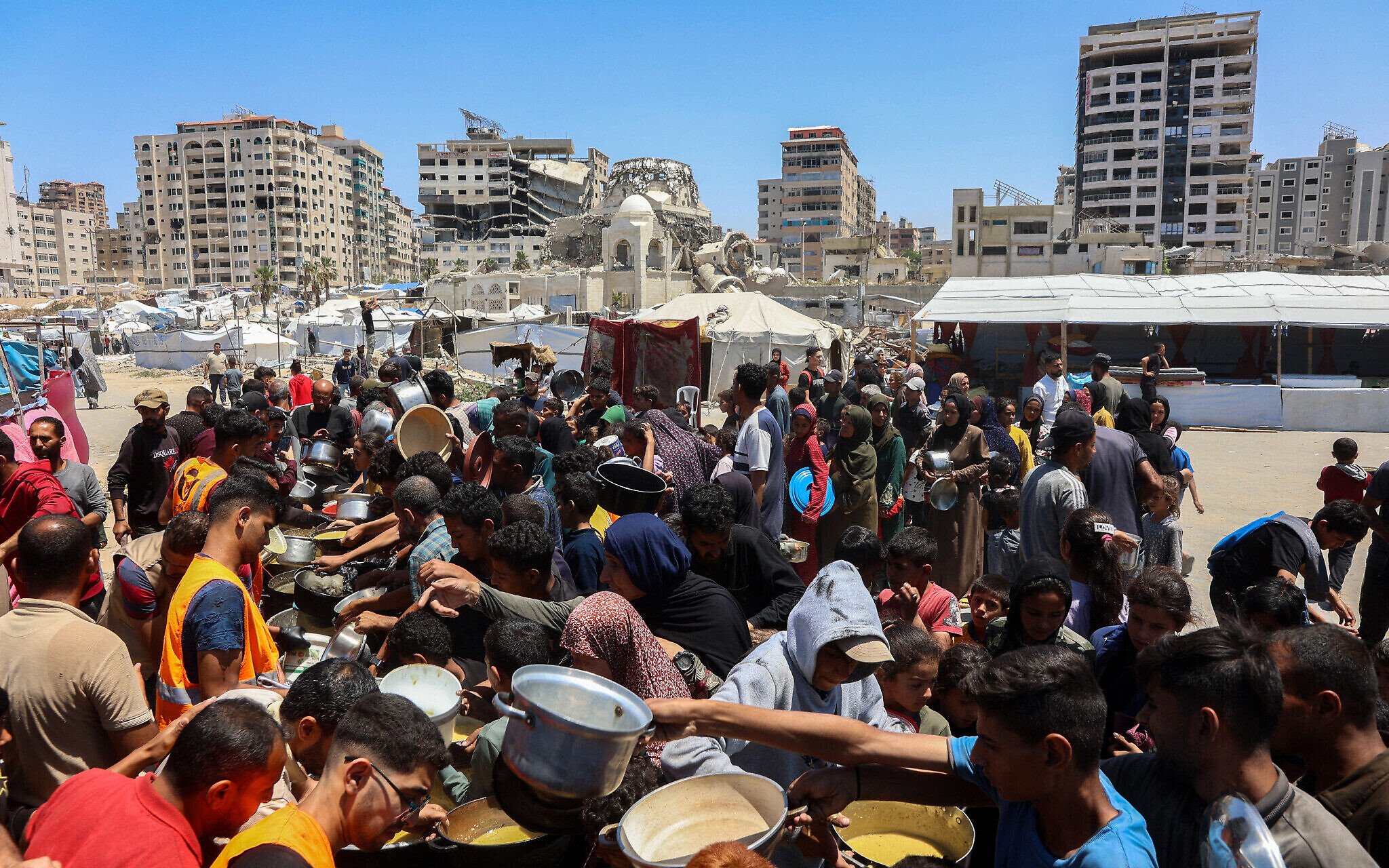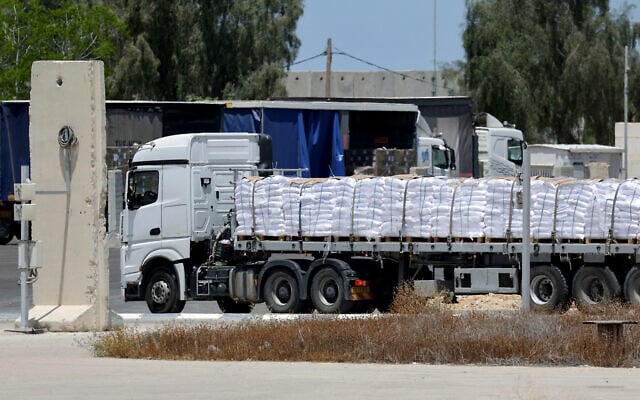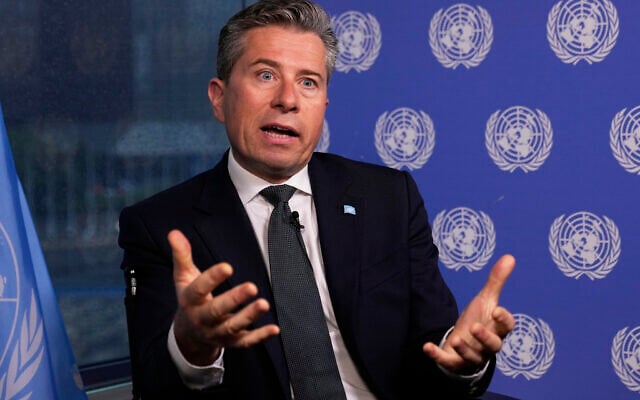



Palestinians and aid agencies in Gaza on Wednesday said they were still waiting for aid to enter the Strip more than 48 hours after Israel, amid mounting international pressure, said it would start sending in desperately needed food and supplies after an 11-week blockade.
The UN has said even though trucks have entered Gaza, the Israeli army has not given permission to pick up the aid on the Gaza side of the border. The IDF body responsible has declined to comment on the charges.
“None of this aid – that is a very limited number of trucks – has reached the Gaza population,” said Antoine Renard, country director of the World Food Program (WFP), who said the trucks appeared to be stopped in Kerem Shalom, the sprawling logistics hub at the south-eastern corner of the Gaza Strip.
Abdel-Nasser Al-Ajramy, the head of the Gaza bakery owners’ society, said at least 25 bakeries that were told they would receive flour from the WFP had seen nothing, and the people waiting for food had no relief from hunger.
“There is no flour, no food, no water,” said Sabah Warsh Agha, a 67-year-old woman from the northern Gaza town of Beit Lahiya sheltering in a cluster of tents near the beach in Gaza City. “We used to get water from the pump, now the pump has stopped working. There is no diesel or gas.”
Umm Talal Al-Masri, 53, a displaced Palestinian living in an area of Gaza City, on Wednesday described the situation as “unbearable.”
“No one is distributing anything to us. Everyone is waiting for aid, but we haven’t received anything,” she told AFP.
“We’re grinding lentils and pasta to make some loaves of bread, and we barely manage to prepare one meal a day.”
The Defense Ministry’s Coordinator of Government Activities in the Territories (COGAT), which coordinates the supply of humanitarian aid into Gaza, on Wednesday declined to respond to claims by the United Nations that its agencies have been unable to collect and distribute aid brought into the territory on Tuesday through the Kerem Shalom goods crossing.
Stéphane Dujarric, a spokesman to the UN Secretary General, said on Tuesday that members of a UN team “waited several hours for Israeli green light to access Kerem Shalom area” to pick up the aid that was brought in, but ultimately they had not been able to do so.
COGAT said Tuesday night that 93 UN trucks carrying “flour for bakeries, food for babies, medical equipment, and pharmaceutical drugs” were “transferred via the Kerem Shalom Crossing into the Gaza Strip.”
Israel had blocked all aid from entering Gaza since March 2, arguing that sufficient humanitarian assistance had entered the Strip during a six-week ceasefire before that and that Hamas was stealing aid, with the blockade necessary to pressure the terror group to release the dozens of hostages it is holding.
In recent weeks, however, some officials in the IDF have begun warning the political leadership that the enclave was on the brink of starvation.
UN agencies and humanitarian organizations have said that “acute hunger” and displacement caused by Israel’s renewed military campaign and “extreme levels of deprivation” in Gaza mean that the civilian population is in desperate need of large volumes of aid to avoid a humanitarian disaster.
Before the ceasefire that went into effect on Jan. 19, COGAT and the UN were in an ongoing dispute about who was responsible for aid distribution difficulties.
The UN claimed that COGAT and the IDF frequently refused their requests for collection and distribution authorization, and that dangerous and complex conditions inside Gaza made aid distribution very difficult.
However, COGAT claimed that the number of times it denied authorization was extremely low, and presented figures to the High Court of Justice to that effect. It also claimed that the UN was inefficient in delivering the aid, and pointed out that large quantities of aid frequently accumulated on the Gazan side of Kerem Shalom.
Aid groups also charge that aid that has been allowed in is massively insufficient.
The amount of aid Israel has started to allow into war-ravaged Gaza Strip is not nearly enough and is “a smokescreen to pretend the siege is over,” the Medecins Sans Frontieres (Doctors Without Borders) aid group said.
“The Israeli authorities’ decision to allow a ridiculously inadequate amount of aid into Gaza after months of an air-tight siege signals their intention to avoid the accusation of starving people in Gaza, while in fact keeping them barely surviving,” says Pascale Coissard, MSF’s emergency coordinator in southern Gaza’s Khan Younis.
Meanwhile, Israel agreed to allow humanitarian assistance from the United Arab Emirates into Gaza, which will initially feed 15,000 people, Abu Dhabi announced Tuesday following a phone call between Emirati Foreign Minister Abdullah bin Zayed and his Israeli counterpart, Gideon Sa’ar.
“The initiative also includes the provision of essential supplies to support the operation of bakeries in the Strip, as well as critical items for infant care, while ensuring a continuous supply to meet the ongoing needs of civilians,” said the UAE Foreign Ministry’s director of communications, Afra al-Hameli, in a statement.
Israel has relied heavily on the UAE’s support for humanitarian aid in Gaza. Abu Dhabi says its assistance amounts to over 40% of the aid that enters the Strip.
Earlier this month, Israel sought to convince the UAE to bankroll a new aid initiative led by the newly founded Gaza Humanitarian Foundation. Aid groups have pushed back against the effort, saying it fails to address the humanitarian crisis and forces the mass displacement of Gazans, while failing to feed almost 40 percent of them initially. Emirati officials accordingly told their Israeli counterparts that they could not back the GHF initiative as it currently stood, a source familiar with the matter told The Times of Israel.
The US-backed GHF will start work in Gaza by the end of May under a heavily criticized aid plan that the UN aid chief Tom Fletcher has described as a “fig leaf for further violence and displacement” of Palestinians in Gaza.
During Tuesday’s call between the foreign ministers, bin Zayed “affirmed the importance of ensuring the urgent, sustainable, safe and unhindered delivery of humanitarian, relief, and medical assistance to the brotherly Palestinians in the Strip,” the Emirati readout said, adding that the ministers also discussed efforts to reach a hostage release and ceasefire deal between Israel and Hamas.
Amid growing global outrage, the United Kingdom said Tuesday it was suspending free trade agreement negotiations with Israel and taking other punitive measures, including the imposition of sanctions on a list of West Bank settlers, in response to Israel’s wartime policies during its conflict with Hamas in Gaza.
Additionally, the European Union agreed to review its cooperation deal with Jerusalem over alleged human rights abuses in Gaza.
On Monday, the leaders of Britain, France, and Canada issued a joint statement condemning Israel’s handling of the humanitarian situation in Gaza and calling on Israel to immediately halt military action in the enclave and allow in more aid, threatening “further concrete actions in response” if Jerusalem refuses.
After the UN’s Fletcher told the BBC Tuesday that some 14,000 babies in Gaza could die in the next 48 hours if aid does not reach them in time, the British broadcaster clarified that this claim was false and based on an incorrect interpretation of a report issued by the UN’s Integrated Food Security Phase Classification (IPC).
The claim was widely reported in international media outlets, including The Times of Israel, and was repeatedly cited by UK lawmakers during a House of Commons debate on Tuesday.
However, the BBC said Wednesday that after asking the UN’s Office for the Coordination of Humanitarian Affairs for clarification, it turns out the remarks were based on an IPC report that warned that 14,100 severe cases of acute malnutrition were expected to occur between April 2025 and March 2026 among children aged between six months and five years.
This means that in fact, according to the UN report, not all of the 14,000 children are babies, they are not all expected to die, and — most notably — this is predicted to happen over the course of a full year, not 48 hours, if aid isn’t allowed into Gaza.
Pro-Israel commentators blasted the UN for the error.
Fletcher “should hand in his resignation immediately for causing a global media panic about something totally made up. He is either a complete numpty or malicious. Either way, serving Hamas’ war goals,” said Eylon Levy, a former spokesman for Israel’s government.




